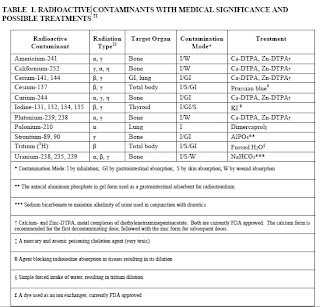Treatments for Radiation Poisoning
You’ve heard that potassium iodide helps protect against some types of radiation.
In fact, it only protects against iodine 131 poisoning (and, if not needed, may cause severe adverse reactions in some individuals).
But there are actually different treatments for different types of radiation.
The following chart provided by the Food and Drug Administration summarizes the treatments for exposure to various radioactive elements (click chart for better image):
Prussian blue is taken to minimize damage from cesium. As FDA notes:
The FDA has determined that the 500 mg Prussian blue capsules, when manufactured under the conditions of an approved New Drug Application (NDA), can be found safe and effective for the treatment of known or suspected internal contamination with radioactive cesium, radioactive thallium, or non-radioactive thallium. This decision is based on a careful review of published literature articles containing reports, data, and experiences of people who were exposed to high levels of thallium or cesium-137 and were treated effectively with Prussian blue.
***
Prussian blue works using a mechanism known as ion exchange. Cesium or thallium that have been absorbed into the body are removed by the liver and passed into the intestine and are then re-absorbed into the body (entero-hepatic circulation). Prussian blue works by trapping thallium and cesium in the intestine, so that they can be passed out of the body in the stool rather than be re-absorbed. If persons are exposed to radioactive cesium, radioactive thallium, or non-radioactive thallium, taking Prussian blue may reduce the risk of death and major illness from radiation or poisoning.
And see this.
DTPA is taken to reduce damage from plutonium, as well as americium and curium. FDA reports:
The FDA has determined that Ca-DTPA and Zn-DTPA are safe and effective for treating internal contamination with plutonium, americium, or curium. The drugs increase the rate of elimination of these radioactive materials from the body.
Sodium bicarbonate plus diuretics (things which increase urine output) may reduce damage from uranium. FDA notes:
Uranium contamination has been treated with oral sodium bicarbonate, regulated to maintain an alkaline urine pH, and accompanied by diuretics. Oral sodium bicarbonate has not been approved in the United States for this indication.
Sodium bicarbonate is baking soda. While I have no idea whether it is true or not, many alternative people advocate bathing in baking soda after being exposed to uranium.
And see this.
Note: I am not a medical professional and this does not constitute medical or health advice. This is for general informational purposes only. Some or all of the above-described substances may have severe side effects or – if used improperly – may cause more damage than they prevent. Don’t take any of these preventatively … only if exposed to high levels of radiation. Consult your doctor before taking any of the above medicines.


